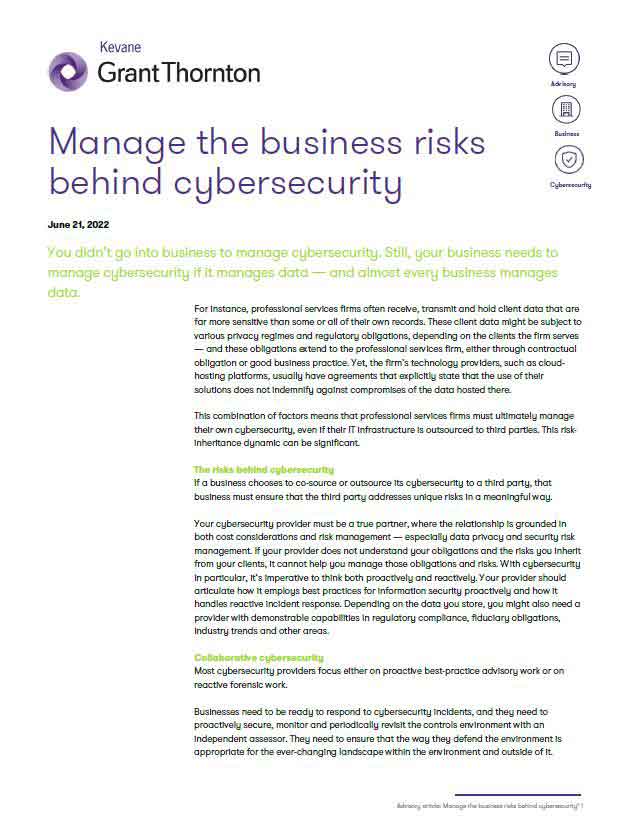-
Financial statements audits
Financial statement audits
-
Compliance audits
Compliance audits
-
Compilations and reviews
Compilations and audit
-
Agreed-upon procedures
Agreed-upon procedures
-
Corporate and business tax
Our trusted teams can prepare corporate tax files and ruling requests, support you with deferrals, accounting procedures and legitimate tax benefits.
-
International tax
Our teams have in-depth knowledge of the relationship between domestic and international tax laws.
-
Tax compliance
Business Tax
-
Global mobility services
Through our global organisation of member firms, we support both companies and individuals, providing insightful solutions to minimise the tax burden for both parties.
-
Sales and use tax and indirect taxes
SUT/ VAT & indirect taxes
-
Tax incentives program
Tax incentives program
-
Transfer Pricing Study
The laws surrounding transfer pricing are becoming ever more complex, as tax affairs of multinational companies are facing scrutiny from media, regulators and the public

-
Business consulting
Our business consulting services can help you improve your operational performance and productivity, adding value throughout your growth life cycle.
-
Risk advisory services
We can help you identify, understand and manage potential risks to safeguard your business and comply with regulatory requirements.
-
Transactional advisory services
Transactions are significant events in the life of a business – a successful deal that can have a lasting impact on the future shape of the organizations involved. Because the stakes are high for both buyers and sellers, experience, determination and pragmatism are required to bring deals safely through to conclusion.
-
Forensic and investigative services
At Grant Thornton, we have a wealth of knowledge in forensic services and can support you with issues such as dispute resolution, fraud and insurance claims.
For instance, professional services firms often receive, transmit and hold client data that are far more sensitive than some or all of their own records. These client data might be subject to various privacy regimes and regulatory obligations, depending on the clients the firm serves — and these obligations extend to the professional services firm, either through contractual obligation or good business practice. Yet, the firm’s technology providers, such as cloud-hosting platforms, usually have agreements that explicitly state that the use of their solutions does not indemnify against compromises of the data hosted there.
This combination of factors means that professional services firms must ultimately manage their own cybersecurity, even if their IT infrastructure is outsourced to third parties. This risk-inheritance dynamic can be significant.
The risks behind cybersecurity
If a business chooses to co-source or outsource its cybersecurity to a third party, that business must ensure that the third party addresses unique risks in a meaningful way.
Your cybersecurity provider must be a true partner, where the relationship is grounded in both cost considerations and risk management — especially data privacy and security risk management. If your provider does not understand your obligations and the risks you inherit from your clients, it cannot help you manage those obligations and risks. With cybersecurity in particular, it’s imperative to think both proactively and reactively. Your provider should articulate how it employs best practices for information security proactively and how it handles reactive incident response. Depending on the data you store, you might also need a provider with demonstrable capabilities in regulatory compliance, fiduciary obligations, industry trends and other areas.
Collaborative cybersecurity
Most cybersecurity providers focus either on proactive best-practice advisory work or on reactive forensic work.
Businesses need to be ready to respond to cybersecurity incidents, and they need to proactively secure, monitor and periodically revisit the controls environment with an independent assessor. They need to ensure that the way they defend the environment is appropriate for the ever-changing landscape within the environment and outside of it.
The key to cybersecurity resilience
Cybersecurity has always been a risk management domain.
To achieve resilience, businesses must identify cybersecurity risk for what it is: a threat to the enterprise. Like any enterprise threat, the proper response involves the engagement of a multidisciplinary team.
Source: Grant Thornton library articles
We are committed to keep you updated of all developments that may affect the way you do business in Puerto Rico. Please contact us for assistance in relation to this or any other matter, we will be glad to assist you.




